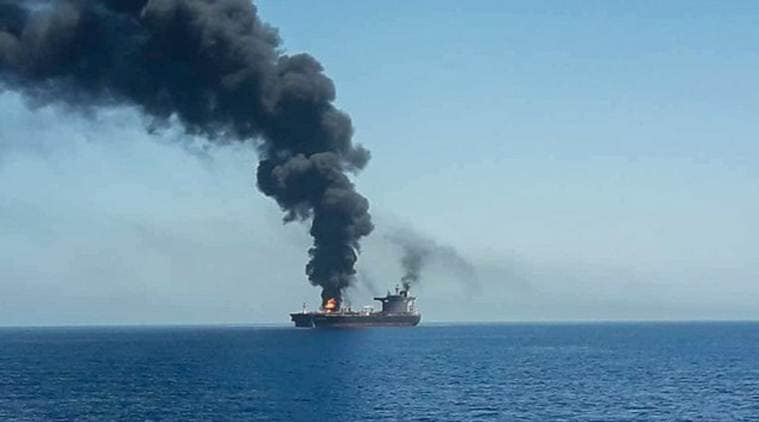
Amid the ongoing tensions between Iran and the US, an attack on two oil tankers in the Gulf of Oman stoked oil and security fears, even as Russia said no one should rush to conclusions over Thursday’s incidents. Tensions have risen in the region since the United States pulled out of a deal between Iran and global powers that aimed to curb Tehran’s nuclear ambitions. US President Donald Trump has been briefed on the issue, the White House said today. Washington has also accused Tehran of being behind a similar incident on May 12. Four tankers were attacked in the same, vital oil shipping route.
However, there were no immediate statements from other quarters, nor any claims of responsibility.
WHAT HAPPENED?
In the first incident, the crew of the Norwegian-owned Front Altair abandoned ship in waters between Gulf Arab states and Iran after a blast. A source told Reuters that the blast might have been from a magnetic mine. The ship was ablaze, sending a huge plume of smoke into the air, the news agency reported. Fortunately, the crew was picked up by a passing ship and handed to an Iranian rescue boat.
In the second incident, a Japanese-owned tanker, was hit by a suspected torpedo, the firm that chartered the ship said. Its crew was also picked up safely.
US Navy’s Fifth Fleet said that it had assisted the two tankers after getting receiving distress calls.
SURGE IN OIL PRICES
Right after the reports emerged, the oil prices saw a surge as crude prices climbed 4%. The attacks took place near the entrance to the Strait of Hormuz, a crucial shipping artery for Saudi Arabia, the world’s biggest oil exporter, and other Gulf energy producers. According to a Bloomberg report, The Strait of Hormuz is the world’s most important oil chokepoint, with about 40% of seaborne trade passing through it.
IRAN’S REACTION
Iranian Foreign Minister Mohammad Javad Zarif described the incidents as “suspicious” on Twitter, noting they occurred during Abe’s Tehran visit. He called for regional dialogue. Japanese Prime Minister Shinzo Abe was visiting Tehran when the attacks occurred, carrying a message for Iran from Trump. The US President has demanded that the Islamic Republic curb its military programs and its influence in the Middle East.
Abe, whose country was a big importer of Iranian oil until Washington ratcheted up sanctions, urged all sides not to let tensions in the area escalated.
WHAT BRITAIN, GERMANY AND OTHERS HAVE TO SAY
Britain said it was “deeply concerned” about the attacks.
Germany, which like Britain remains a signatory to the nuclear pact with Iran, said the “situation is dangerous” and all sides needed to avoid an escalation.
The Arab League said some parties were “trying to instigate fires in the region”, without naming a particular party.
Oman and the United Arab Emirates, which have coastlines on the Gulf of Oman, did not immediately issue any public comment.
Saudi Arabia and the UAE, both majority Sunni Muslim nations that have a long-running rivalry with predominantly Shi’ite Iran, have previously said attacks on oil assets in the Gulf pose a risk to global oil supplies and regional security.
-With inputs from Reuters